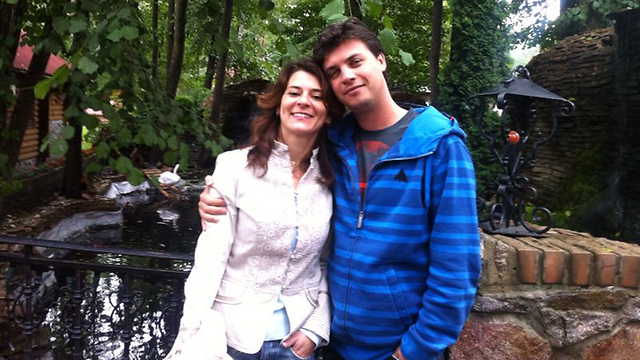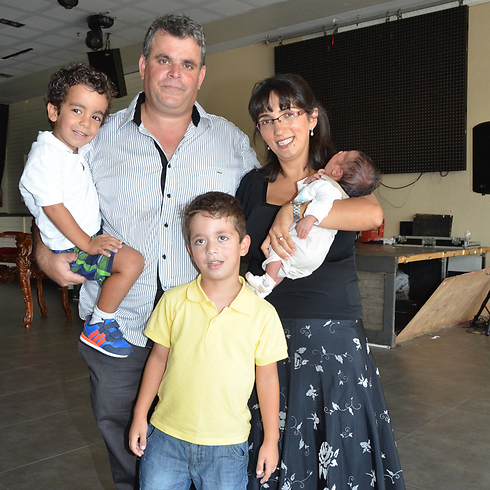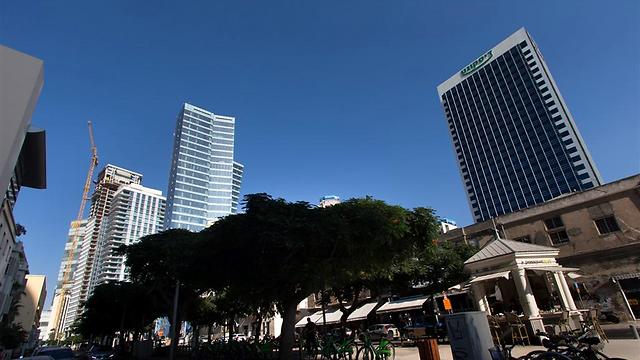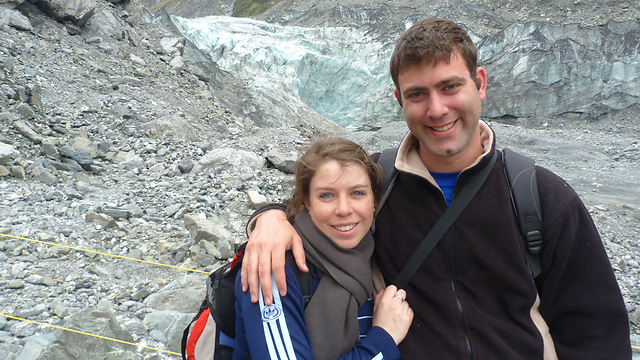
40-year-olds, with 3 children, living with their parents
'If we do not win lottery, we’ll rent our whole life' couples say. Itzik, Malka live with grandma; Ella, Dima are lost in Beersheba; Oren, Edva are losing faith: Who will give us mortgage? Government appraiser: No quick fixes
Currently they rent a four room apartment in Beersheba, but the landlord told them he was going to sell the property, and Dolnicheki and Gitelman began to look to buy a flat, but then the reality of the real estate market hit them. “An apartment of the size we need will cost approximately one million shekels, and we are not those who want to go into debt and take a 30-year mortgage," they explained, "So we're sitting on the fence for now.”
Although the housing crisis has been hovering over the Israeli economy since the protests of the summer of 2011, and despite government announcements of steps being taken which are supposed to bring down prices, on Sunday the government appraiser published a survey of housing prices in 16 major cities, which shows they continue to rise, increasing 5.6% in the third quarter of 2013 as compared to last year. This dismal figure makes it difficult for couples such as Dolnicheki and Gitelman, and even harder on families earning a lot less than them.
“I looked into homes in Beersheba," says Gittleman. "But the good neighborhoods like Ramot are too expensive. We want to expand our family, so we need to choose an area where there will be good educational infrastructure – parks, schools – but there are no reasonable prices in these neighborhoods.”
Dolnicheki, Gitelman
Dolnicheki added, "I'm not looking for a new apartment , but something old, small and modest. But those houses cost a lot as well. I work with people who earn a lot less than we do, and they are looking for apartments at one million shekels and up. I do not know how they intend to continue if interest rates go up.”
Government appraiser: No quick fixes
Chief Government Assessor at the Justice Ministry Tal Alderoti, who published the statistics, told Ynet that his only recommendation for those who intend to buy apartments is to be patient. "In our industry, things get done slowly and results appear only after a long time. There is no quick fix," he said. "All government officials connected to the issue are putting forth their best efforts to make land available and to release homes to the market. When that happens, we will see that the increase is slowing and even that the prices are decreasing.”
Alderoti refers, among other things, to Finance Minister Yair Lapid's plan to set up a government company that will work on the construction of 150,000 apartments – some for rent and some for sale – as part of affordable housing projects. “A company like this is a correct and good step, the significance is that it is a body has been appointed that will be responsible to coordinate the activities and handle difficulties and obstacles," he said, mentioning the amendment that will increase taxation on investors in real estate. Alderoti added, "The Israel Lands Administration is working hard to increase the availability of land. At the end, this will culminate in an available stock of land for housing.”
You cannot commit to a time period regarding how long will take before the steps influence the market. But assuming that it takes a few years, how will homebuyers who are forced to pay more than two million shekels for a four room apartment in central Israel get by?
"The fact is that there are transactions at these prices. The price reflects an average for a four room apartment, and remember that there are very large differences between the various neighborhoods in every city.”
Living with their parents
Itzik and Malka, forty somethings from Or Yehuda, are parents of three, aged 6, 4 and a two-month-old baby. Itzik works in importing vehicles and Malka is a midwife. Together they earn about 17,000 ($4800) per month. Since leaving their government-subsidized apartment in Tel Hashomer last year and moving in with Malka's mother, they’ve reduced their spending by NIS 5,000 ($1400) a month.
Itzik, Malka and their children (Photo: Zuri Mepatel)
We do not pretend to be poor because we both work in good jobs," said Itzik. "But even to rent, to stand on your own feet and to try to save for an apartment – it's hard. To reach a state in which we can take a mortgage for less than one million shekels we will have to stay here at least another two years. The plan is to find a four room apartment in Or Yehuda.
Malka added: "During the period in which we’ve been living here, we managed to do a lot. A law degree, raising three children and we saved money for an apartment, but the prices are constantly rising. It’s a difficult war to win.”
Solution in public transport
The crisis in the housing market is influenced by variables from areas seemingly unrelated to real estate, but in practice they play a significant role in the fact that hundreds of thousands have trouble to get to an apartment. Dror Gershon, an architect and urban planner, is the CEO of the Movement for Israeli Urbanism. He said that social considerations, modes of public transit, and accessibility to business centers impact on housing prices as much as the gap between supply and demand.
Israel is not crowded and they do not build enough in city centers, around public transportation hubs and near employment centers," he said. "The solution of more land and more apartments is one-dimensional. If we continue like this, housing prices will not fall, because of the simple reason that on these lands on the edge of the cities, no one will build and no one will buy.”
New apartment towers in Tel Aviv (Photo: Yaron Brener)
According to him, there are 300,000 apartments within the approved plans that cannot be metrialized because they are located far from the city centers, so the land is not attractive. "What will a young couple who buys an apartment and does not have two cars do? The housing shortage needs to be resolved within the city centers, where there is access to all functions. It is tolerable when sticking young people in remote neighborhoods in the center of the country, but when it happens in Netanya, Hadera, Haifa, Kiryat Shmona and Beersheba, it is not attractive for developers to build there, and it is not attractive for
home owners to buy there.
Re-assessing reality
Over the past year, Assaf and Galit Segev have been trying to find an apartment in Haifa at a price they can afford – but they have been unsuccessful. Both work in professional jobs – he recently completed his internship at a law firm, and she works at the Technion. "You start with a shopping list," said Assaf. "Four rooms, minimum 100 square meters, master bedroom , parking. And you expect to find such an apartment within the amount you budgeted for yourself. Here it was NIS 1.1 million.”
Assaf and Galit Segev (Photo: Galit Segev)
Every weekend, the two saw between two to three apartments. "Very quickly you realize that you cannot forget the shopping list, and you start to trim the size, down to 3 rooms or 3.5, no master bedroom, and still, the price goes up. Until we realized that for less than NIS 1.3 million there is nothing to talk about.
Eventually the couple chose another option: They purchased a double lot in Itlit, together with Galit's parents. Fifteen minutes from Haifa and close to the beach, and now they are building their home on the land. "The cost is the same, in the end, you get more. For the cost of an average apartment in Haifa, you get a villa here. We had another advantage in that my wife's parents already had experience building a house alone, and this led to considerable cost-cutting.”
Michal Margalit, Gilad Morag, Ilana Curiel and Ahiya Raved contributed to this report. Yulia Fortus assisted in production.
- Receive Ynetnews updates directly to your desktop














